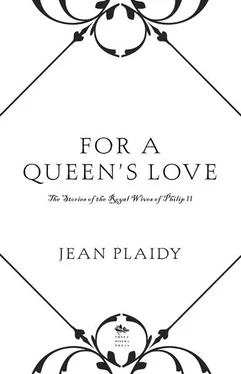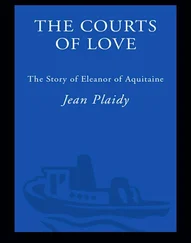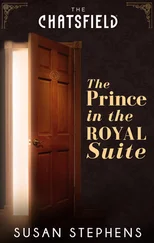Jean Plaidy - For a Queen's Love - The Stories of the Royal Wives of Philip II
Здесь есть возможность читать онлайн «Jean Plaidy - For a Queen's Love - The Stories of the Royal Wives of Philip II» весь текст электронной книги совершенно бесплатно (целиком полную версию без сокращений). В некоторых случаях можно слушать аудио, скачать через торрент в формате fb2 и присутствует краткое содержание. Жанр: Старинная литература, на русском языке. Описание произведения, (предисловие) а так же отзывы посетителей доступны на портале библиотеки ЛибКат.
- Название:For a Queen's Love: The Stories of the Royal Wives of Philip II
- Автор:
- Жанр:
- Год:неизвестен
- ISBN:нет данных
- Рейтинг книги:5 / 5. Голосов: 1
-
Избранное:Добавить в избранное
- Отзывы:
-
Ваша оценка:
- 100
- 1
- 2
- 3
- 4
- 5
For a Queen's Love: The Stories of the Royal Wives of Philip II: краткое содержание, описание и аннотация
Предлагаем к чтению аннотацию, описание, краткое содержание или предисловие (зависит от того, что написал сам автор книги «For a Queen's Love: The Stories of the Royal Wives of Philip II»). Если вы не нашли необходимую информацию о книге — напишите в комментариях, мы постараемся отыскать её.
For a Queen's Love: The Stories of the Royal Wives of Philip II — читать онлайн бесплатно полную книгу (весь текст) целиком
Ниже представлен текст книги, разбитый по страницам. Система сохранения места последней прочитанной страницы, позволяет с удобством читать онлайн бесплатно книгу «For a Queen's Love: The Stories of the Royal Wives of Philip II», без необходимости каждый раз заново искать на чём Вы остановились. Поставьте закладку, и сможете в любой момент перейти на страницу, на которой закончили чтение.
Интервал:
Закладка:
“They’d not harm you, a boy of … how old is it?”
“Nine years, sir.”
“Nine years! ’Tis young to be left alone and helpless … and your mother with two others.”
“They will take all we have …”
Sir Richard nodded. “But ’twas not done for the love of your father’s possessions. It was done to please the people. Who knows …” He looked at the boy shrewdly, but stopped short.
“Did the people so hate my father then?” asked the boy incredulously.
“Kings must have scapegoats, my boy. When a king does what his subjects do not like, that is the fault of his statesmen; it is only when he pleases them that the credit is his. It is the late King against whom the people cry out. Your father and Sir Richard Empson are the scapegoats.”
The boy clenched his fists. “To be a scapegoat! I like that not. I would be a man … and a ruler.”
Then suddenly he began to cry, and the man, walking beside him, helplessly watched the tears roll down his cheeks.
Sir Richard understood. It was natural that the boy should cry. He did not speak for some seconds, then he said: “This day you shall come home with me. Nay, do not concern yourself. I have seen your mother. I have told her that I would find you and take you to my home.”
They had now reached the river’s edge where a barge was waiting; and as they went slowly up the river, the sobs which shook the young body became less frequent.
At length they alighted, and mounted the privy steps which led to the lawns before Sir Richard’s home.
As they entered the mansion, and crossed the great hall, Sir Richard called: “Jane! Where are you, my child?”
A girl, slightly younger than John, appeared in the gallery and looked down on the hall.
“I have a playmate for you, Jane. Come here.”
Jane came solemnly down the great staircase.
“It is John,” she said; and the boy, looking into her face and seeing the tear stains on her cheeks, knew that she too had wept for his father, and was comforted.
“He has suffered much this day, Jane,” said Sir Richard. “We must take care of him.”
Jane stood beside the boy and slipped her hand into his.
Sir Richard watched them. Let the boy forget the shouts of the mob on Tower Hill in the company of little Jane. He was safe with Jane.
As Sir Richard Guildford watched John Dudley grow away from his tragedy in the months that followed, he recognized in him that strength of character which had been Edmund Dudley’s. He was excited by the boy, sensing in him latent ambition, the will to succeed, the passionate desire to bring back honor to the Dudley name. Sir Richard could look with pleasure upon the growing friendship between his daughter and this boy; and nothing less than having John in his own house and bringing him up as his son would satisfy him.
It was not difficult to arrange this, for Sir Edmund’s widow and her children were forced to look to relations and friends for help, and Lady Dudley was only too glad that Sir Richard had taken this interest in her son.
It was Sir Richard’s custom to talk to the boy, to nourish that ambition which he knew was in him; and one day, as they walked in the City to Fleet Lane and over Fleet Bridge and on to Ficquets Fields, Sir Richard talked of John’s father.
“Your father was a great man, John. When he was your age, his position was little better than your own.”
“Nay sir,” said John. “It is true that my father was the son of a small farmer, and himself but a lawyer, yet he was descended from the Lords Dudley; and I am the son of a man who is called a traitor.”
Sir Richard snapped his fingers. “The connection with the Lords Dudley was never proved,” he said, “and I doubt it existed outside your father’s imagination.”
The boy flushed hotly at that, but Sir Richard went on: “Oh, it was clever enough. Dudley needed aristocratic ancestors, but he found them for himself. No doubt he made good use of them. But between ourselves, John, there is more credit due to a man when he has had to climb from the valley to the top of the mountain than when he starts near the top.”
John was silent and Sir Richard continued: “Just for ourselves we will see Sir Edmund Dudley as the son of a farmer, himself a lawyer, yet such a master of his profession that the King sought his aid and through him and his friend Empson, ruled England.”
The boy’s eyes had begun to shine. “The son of a farmer merely—and he one of those who ruled England!”
“What should that teach you? Just this: No matter how lowly you may be, there is no limit— no limit—to the heights to which you may climb. Think of the King. Dare he look too far back? Is it not true that his Tudor ancestor was the son of a groom, and a bastard? Think, boy, think! This is treason and I’ll whisper it. Dudley or Tudor? Is one better than the other? Remember it. Always remember it. Your father had great ambition. It may be now that he looks down from Heaven on you … his eldest son. It may be that he asks himself: What will my son do in this world? Will he rise as I did? Will he learn from my mistakes? Has he the fire within him which will make him a great man? John, I doubt not that your father looks down from Heaven upon you and prays and hopes.”
John did not forget those words. He was determined to be as great a man as his father.
In the games he played, he was always the leader. Already he was Jane’s hero. Sir Richard was pleased as he watched the growing affection between John Dudley and Jane Guildford.
Sir Richard’s position at Court had brought him into contact with the King, who was as yet a careless boy in love with pleasure, yet a boy with an awakening conscience. Sir Richard thought that the King’s conscience might play its part in the future of his young protégé.
Henry still frowned at the name of Dudley. He was well aware that the execution of his father’s favorite and adviser had been carried out for the sake of his, Henry’s, popularity. Henry had not yet come to terms with his conscience. It could not yet persuade him, as it would later, that Dudley and Empson had deserved their fate, so the very mention of the name Dudley brought discomfort to him. But when Sir Richard subtly begged royal permission to ask the Parliament for the repeal of the attainder against the Dudleys, Henry was almost eager to give that permission.
Let the boy inherit his father’s wealth. The King did not want it; he had that vast accumulation of riches, which his own father had amassed through his thrifty reign, to squander. Yes, let the attainder be repealed. Let the son of Edmund Dudley have his father’s riches. The King could then feel happier when the names of Dudley and Empson were mentioned; he could put aside the thought that those two men had been executed to placate the people from whom much of his father’s wealth had been extorted.
The first step was therefore taken. John was no longer penniless. He was a rich parti for young Jane; although he could not yet go to Court.
Sir Richard came home full of excitement. “See what I have done for you, John!” he cried. “Now it will be your turn.”
“Yes, now it is my turn,” said the solemn boy.
Jane watched them gravely, wondering what this was all about. But there was no need to explain such matters to Jane. She was happy because her father was happy; and she saw in John that deep brooding concentration which she respected although she could not share it.
As they went out to the stables together she said: “Something good has happened, has it not?”
He nodded but he said no more then for he did not wish the grooms to hear.
As they rode across the clover-starred meadows, he said: “I am no longer without means. My father’s fortune is to be returned to my family.”
Читать дальшеИнтервал:
Закладка:
Похожие книги на «For a Queen's Love: The Stories of the Royal Wives of Philip II»
Представляем Вашему вниманию похожие книги на «For a Queen's Love: The Stories of the Royal Wives of Philip II» списком для выбора. Мы отобрали схожую по названию и смыслу литературу в надежде предоставить читателям больше вариантов отыскать новые, интересные, ещё непрочитанные произведения.
Обсуждение, отзывы о книге «For a Queen's Love: The Stories of the Royal Wives of Philip II» и просто собственные мнения читателей. Оставьте ваши комментарии, напишите, что Вы думаете о произведении, его смысле или главных героях. Укажите что конкретно понравилось, а что нет, и почему Вы так считаете.












